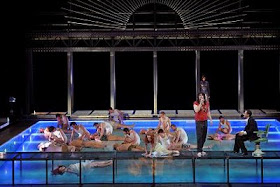 Król Roger, Opéra de Paris (photo by Ruth Walz) |
What we saw [...] was infuriatingly like [...] a sort of acid trip that went systematically against what was written in the libretto (coauthored by the composer), as mediocre and weak as it is. But since LSD is not something one can take inside the Opéra de Paris, the viewer was thus forced to witness -- eyes wide open, mind lucid -- the psychedelic ravings of the director.Part of the problem was the imagery of the staging and the video playing behind the singers, much of it drawn from Pasolini's film Teorema, with its homoerotic tributes to youth and beauty (incarnated in the movie by the mysterious visitor -- played by, of all people, the young Terrence Stamp -- who seduces all the members of a middle-class family). According to Machart, the audience hailed the end of Gerard Mortier's tenure in Paris with one of the loudest rounds of boos in recent memory, intended squarely for Warlikowski.
It is possible to feel somewhat asphyxiated by the permanent purpleness of the work, which bends under the weight of the gold, stucco, and obscenities of a dionsyiac orchestration that finds its singularity while borrowing from Wagner, Strauss, Ravel, and Schreker. It is beautiful like a Persian carpet, a Klimt painting, going to one's head like an intoxicating perfume, tasty as a platter of sweet and salty flavors. But the composer Arthur Honegger could just as well have reproached Szymanowski as he did Olivier Messiaen about his Turangalilâ-Symphonie, of putting too many spices in his orchestra...
EXTRA, EXTRA: See the production for yourself by webcast from the video site of the Arte channel, my new favorite way to spend extra summer hours. There are no subtitles, so you may want to refer to this copy of the libretto. Not that the libretto will help you understand why Eric Cutler's Shepherd appears in Act III wearing high heels and a huge Mickey Mouse head, forming a conga line with similarly attired supernumeraries and eventually leading them in yoga moves. At the end you can also watch Warlikowski receive the crowd's boos, while he calmly chews his gum.
I imagine Renaud Machart to look like Anton Ego from Ratatouille. I'm not defending Krzysztof Warlikowski because based on this snap shot of the staging it looks like the director would have achieved the same effect if he had simply masterbaited on stage for two hours.
ReplyDeleteI just posted the last 7 mins. of the production on YouTube. The link is http://www.youtube.com/watch?v=DM6aTNFCxWs
ReplyDeleteI've just watched the entire production on Youtube and I must say....it's brilliant! Seeing as the original libretto's Shepherd is a dionysiac sensualist cherry-picking bits from the world's religions, I can't really see why anyone would have trouble with him being presented by Warlikowski as a giggling hippy. There's a hint of the summer of love to Szymanowski's vague, mystical melting point and the Bastille production is in part a critique of those ideas.
ReplyDeleteLikewise, Szymanowski's royal family are re-imagined as a self-obsessed, morally bankrupt bunch, both literally and metaphorically separated from their subjects by an opaque screen. I've seen too many operas/plays that fawn over royalty, so presenting Roger and Co as something akin to Monaco's fatuous Grimaldis is very refreshing - didn't Princess Grace end her days following some shadowy cult for rich people?
And the mickey mouse masks at the end? Sledgehammer subtle I admit, but not all that hard to read - The Summer of Love's values soon curdled into crass commercialism.
You may not like it, but to suggest that the production could equally have been of Lucia di Lammermoor suggests you are so hostile to anything new you decided not to bother trying to make sense of it very early on. If opera is going to mean anything today (and that is, alas, a big "if") then it has to be more than pretty retellings of works ossified in time
but to suggest that the production could equally have been of Lucia di Lammermoor suggests you are so hostile to anything new you decided not to bother trying to make sense of it very early on.
ReplyDeleteI wrote nothing of the sort. I have written plenty of positive reviews of updated or altered stagings, where the director departs from the libretto -- as long as it makes some sort of sense. Renaud Machart was much more hostile to the staging than I was -- I was mostly just bemused.
Anyway, thanks for your comment. The combination of superciliousness and anonymity is always a winner.
sorry - reading back I realise that, concerning the remark about Lammermoor, you did indeed write nothing of the sort, and therefore my criticism is unjust. I got this from another website, to which I suppose I should redirect my comment.
ReplyDeleteI find that commenting with my full details on sites seems to unleash a torrent of spam, but if you think that's too surreptitious, my details are above
I sympathize with you about the spam. Using a dummy email address for these things usually does the trick. I do encourage using one's name when commenting: anonymous comments tend to be the most trollish.
ReplyDelete